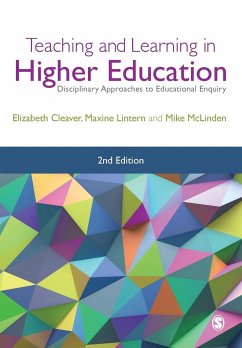This book explores best practice approaches to undertaking enquiry into learning and teaching in higher education for staff from all academic disciplines. A general introduction to the methods most commonly used in undertaking enquiry in the field of education is complemented by chapters exploring how research methods from a range of disciplinary areas can be adapted and used for educational enquiry.
New to this second edition:
· Chapters on interdisciplinary educational enquiry in geography and using ethnographic methods for educational enquiry
· New case studies and suggested activities
· A reflective final chapter inviting readers and their institutions to develop and promote an organisational culture founded on critical enquiry
This is essential reading for anyone undertaking HE qualifications in learning and teaching (including PGCTLHE and PGCAP) and for academics wishing to apply their skills of research and enquiry to their learning and teaching practice.
New to this second edition:
· Chapters on interdisciplinary educational enquiry in geography and using ethnographic methods for educational enquiry
· New case studies and suggested activities
· A reflective final chapter inviting readers and their institutions to develop and promote an organisational culture founded on critical enquiry
This is essential reading for anyone undertaking HE qualifications in learning and teaching (including PGCTLHE and PGCAP) and for academics wishing to apply their skills of research and enquiry to their learning and teaching practice.
'This book makes a timely contribution to debate and developing practice in critical educational inquiry, specifically in the context of research intended to enhance teaching quality, both as a laudable aim in itself and in response to external drivers such as the TEF. The central thrust of the book acknowledges the challenges for non-HE researchers coping with the 'strange land of higher education studies' and the importance of locating academic research within the discipline as a starting point. The authors make a powerful case for critical inquiry as a means of building disciplinary and cross-disciplinary communities and its potential to drive institutional culture change.'
Fran Beaton
Fran Beaton

